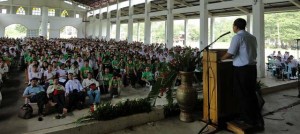Burma’s Inequalities Must be Addressed Through National Reconciliation and Broad Reforms
By Burma Partnership • June 11, 2012The past week has brought shocking news of sectarian tensions erupting in violence in Arakan State, while 9 June marked one year since armed conflict broke out in Kachin State, ending a 17-year long ceasefire agreement between the Burma Army and the Kachin Independence Army (KIA). These problems highlight the urgent need for national reconciliation across political, ethnic and religious lines, and comprehensive reforms that address deep inequalities in Burma.
On 8 June, the Kachin Women’s Association – Thailand (KWAT) released a new report at a press conference with other Kachin organizations to highlight the ongoing armed conflict and human rights abuses. KWAT’s report documents how in the last year, the people of Kachin State have faced arbitrary arrest, torture, forced labor, rape and sexual violence at the hands of the Burma Army who continue to commit these crimes with impunity. Among the most horrendous accounts are those of women being gang-raped, tortured and used as sexual slaves by Burma Army soldiers. More than 75,000 people have fled the fighting and human rights violations in Kachin State, but receive virtually no humanitarian assistance. After being blocked by the government on
several occasions, the UN is now only providing food rations to a few thousand internally displaced persons on a monthly basis, leaving people in a precarious situation with no end in sight as ceasefire negotiations have failed repeatedly.
On 5 June, Kachin organizations and communities around the world issued a letter to President Thein Sein calling for an immediate end to the humanitarian crisis. The letter, which was copied to UN Secretary-General Ban Ki-moon and UN Special Rapporteur on the situation of human rights in Burma Tomás Ojea Quintana, was endorsed by 71 organizations, including regional and international non-governmental organizations. The letter was a part of actions organized around the world to highlight the dire situation; events were held in Burma, Thailand, Japan, Australia, India, Sweden, Switzerland, UK, Canada and the US, with more planned in the coming weeks. For more news and photos of these events, please see here.
This week has also brought troubling news about sectarian tensions boiling over in violent attacks between Buddhist Rakhines and Muslim Rohingya in several townships in Arakan State. It is still too early to obtain objective accounts of what is happening on the ground; a declared state of emergency and imposed curfew have yet to quell the violence or heated responses to the situation from throughout the country and around the world.
In such moments of crisis, it is important to remember our common humanity and that under the Universal Declaration of Human Rights, “all human beings are born free and equal in dignity and rights [and] everyone is entitled to all the rights and freedoms set forth in [the] Declaration, without distinction of any kind, such as race, colour, sex, language, religion, political or other opinion, national or social origin, property, birth or other status.”
Sadly, the state-run media’s use of a derogatory term for Muslims has fuelled the tensions, inciting divisions and discrimination along the very lines the Universal Declaration of Human Rights aims to eliminate. The situation in Arakan State sadly illustrates how urgently national reconciliation is needed in order to address issues of political, social, ethnic and religious inequalities throughout Burma.
With the lifting of sanctions, countries such as the US and most recently Australia have said they will continue to encourage further reforms and monitor the human rights situation in Burma. This week’s problems in Arakan State have underscored the need for the international community to push for comprehensive reforms and peace initiatives that address issues of human rights violations and discrimination that are deeply rooted in the country.
Tags: Arakan State, Armed Conflict, Burma Partnership, Kachin State, National ReconciliationThis post is in: Blog
Related PostsU.S.: Lifting Sanctions on Myanmar Puts Human Rights Progress At Risk
Advisory Commission on Rakhine State – A Welcome Investigation into Arakan State’s Human Rights and Humanitarian Crisis
NLD Government Must Lift All Aid Restrictions in Arakan State
United States Commission on International Religious Freedom – Burma: 2016 Annual Report
(၂၉) ႏွစ္ေျမာက္ စစ္ေတြဆန္ျပႆနာေန႔ ဝမ္းနည္းေအာက္ေမ့ဖြယ္ အထိမ္းအမွတ္ သေဘာထားထုတ္ျပန္ခ်က္










 All posts
All posts